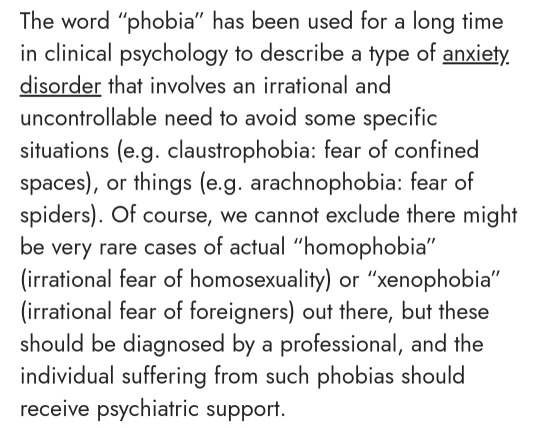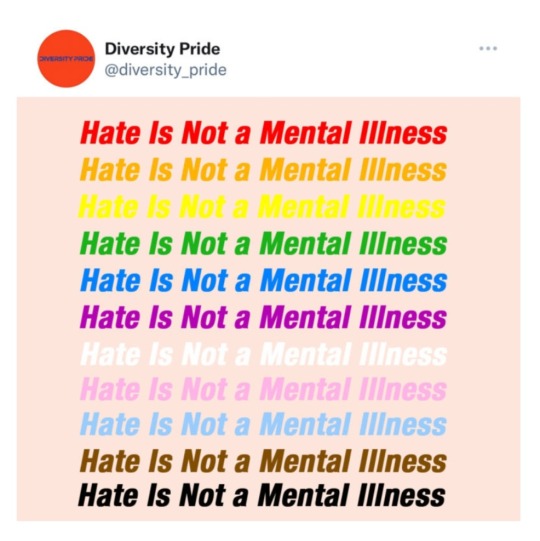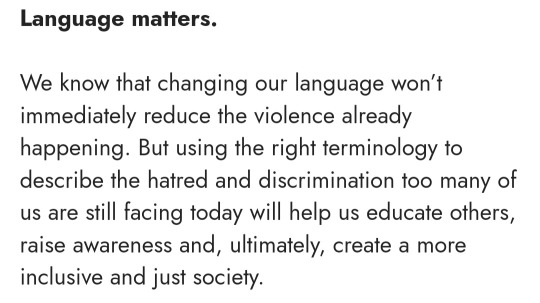#this ended up being FAR more of an Effortpost than intended
Explore tagged Tumblr posts
Text

@themountainking98 this is an interesting thought! id only ever seen it argued as "it's hate, not fear" but i couldnt rule out that a mental illness association is a motivating factor, so i tried looking into it...
(the first thing im noticing is that this isnt quite as "short-lived" as i thought... wiktionary's got examples of 'queermisia' in some pretty notable sources (incl unis) from 2018 through 2022--i could swear id encountered it empirically prior to 2018, but memory is unreliable etc)
this page (the name "misia pledge" is making me giggle btw) is the most in-depth look at the terminology i can find (note that there's no date (at least not one i can see on mobile) so it's difficult to pinpoint the relationship (reflective, generative, etc) of this page to the overall trend) and it's pretty upfront wrt stated motivation:

but there are two allusions to mental illness:


(sidenote--the spiel about how "homophobia" and "xenophobia" could be Legitimate Mental Illnesses, But A Professional Would Need To Diagnose Them is, like, a flawless snapshot of the ways that psychiatry is deployed in these discourses. this reads like a parody)
but overall this article's most repeatedly voiced concern is re the "accuracy" of '-phobia'

(incidentally according to etymonline 'homophobia' had previously been used to mean "fear of humans". mildly interesting)
anyway (opinion time lol) both "phobia means fear" and "phobia means mental illness" are, like, ultimately the same grievance--they both express a (pedantic, prescriptive) concern about etymological accuracy above everything, & consequently they both reflect magical thinking wrt the relationship between lexical history & present-day usage. if we want to be uncharitable we could even call prescriptive defensiveness of greek morphemes reactionary (this would be unproductive, but it would also be funny)
and the thing is, i DO think there are some instances where a person's use of one term over another is revealing of bias, thought processes, intentions, etc (eg consider what's implied when somebody refers to a trans woman as "they" rather than "she")! but imo in this case: (1) the sanctity of '-phobia' is a silly thing to defend, (2) the words transphobia, xenophobia, homophobia, etc are so well-established atp that there's zero risk of a person acting in good faith missing the meaning of these words Because Of Their Neoclassical Composition, (3) i cant envision potential benefit that would justify the herculean task of "manually" replacing one term with another, & (4) like many (most?) english-language verbiage replacement efforts, it foregrounds an individualist & anglocentric complaint in favour of any structural or material (or remotely useful, frankly) examination. one more screenshot to hammer that home:

im obsessed with this, i keep reading this paragraph and losing my mind. when the benefit proposed by the (seemingly) most thorough (extant) resource is a single paragraph (not even a long one!!) claiming that this Word Swap will help "educate others," "raise awareness", and "create a more inclusive and just society" (lofty claim!!) without offering even One word to explaining How or Why this will happen, that should kind of signal how profoundly unserious it all is lmao
we all remember mogai & batpanda & whatnot but imo the most underrated discursive twist of that era was the short-lived push to problematize the words "homophobia" & "transphobia" because of the -phobia suffix (seemingly ceding rhetorical ground to the overwrought "im not homophobic because im not SCARED of gay people" line??) so a handful of people started saying things like Homobigotry and Queermisia
#this ended up being FAR more of an Effortpost than intended#oh well! i had fun 😁#indigoing#indigo effortposts
25 notes
·
View notes